University: Research, Ethics, and Professionalism in Computing
VerifiedAdded on 2021/06/17
|21
|4436
|181
Report
AI Summary
This report explores the critical intersection of research, ethics, and professionalism within the field of computing. It begins by establishing the importance of ethical conduct in computer science research, given the pervasive impact of technology on modern life. The report then delves into key research questions surrounding ethical implications, professional responsibilities, and strategies for sensitizing professionals to computer ethics. A comprehensive literature review examines past developments, the current state of computing, and specific ethical issues such as accessibility, property rights, accuracy, and privacy. The methodology review evaluates various research approaches, culminating in a detailed project plan. The report addresses policy gaps, complexities in internet research, and the evolving boundaries of computer ethics. Finally, it emphasizes the need for reflection on ethical concerns, particularly with the increasing ubiquity of computing technologies, advocating for a stronger presence of computer ethics in public discourse and policy-making.
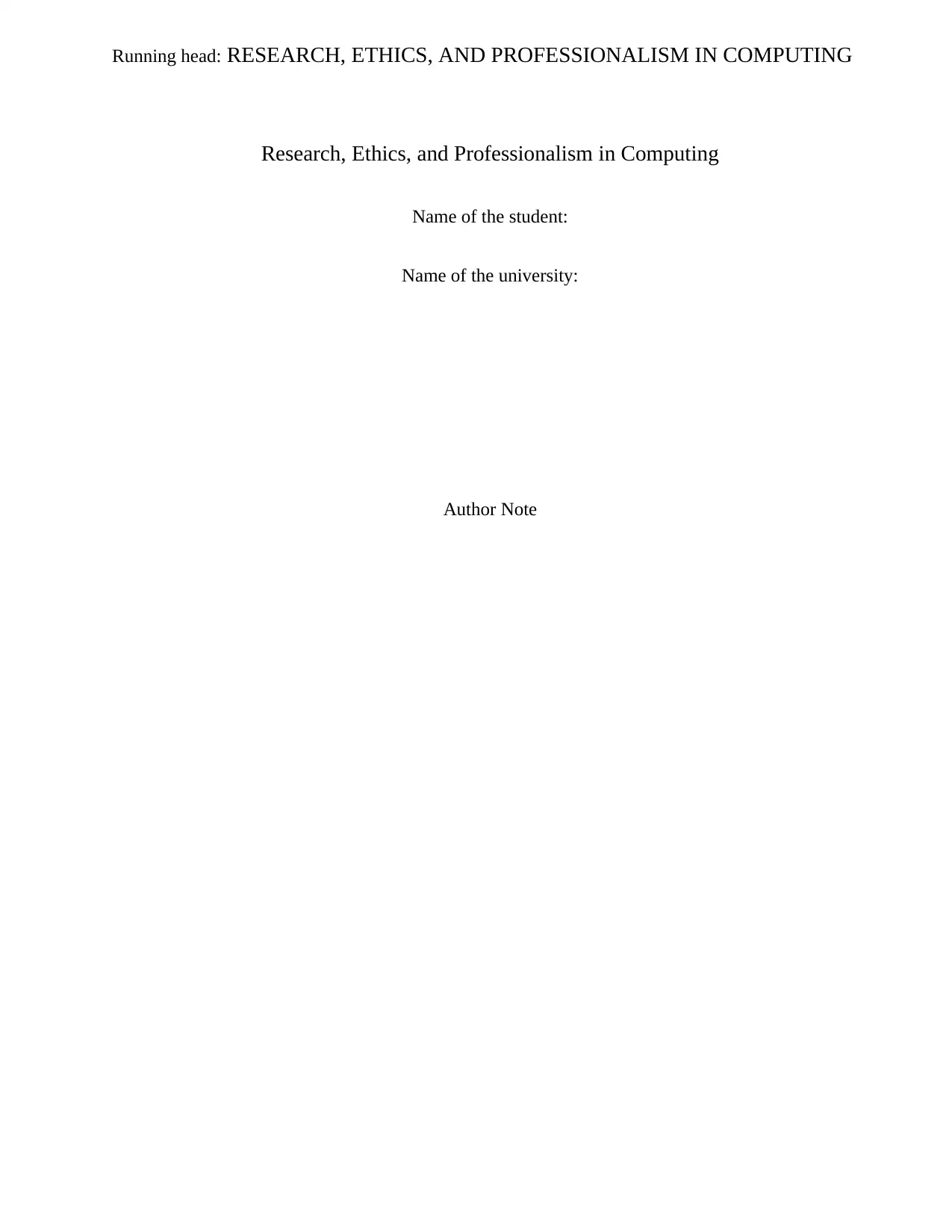
Running head: RESEARCH, ETHICS, AND PROFESSIONALISM IN COMPUTING
Research, Ethics, and Professionalism in Computing
Name of the student:
Name of the university:
Author Note
Research, Ethics, and Professionalism in Computing
Name of the student:
Name of the university:
Author Note
Paraphrase This Document
Need a fresh take? Get an instant paraphrase of this document with our AI Paraphraser
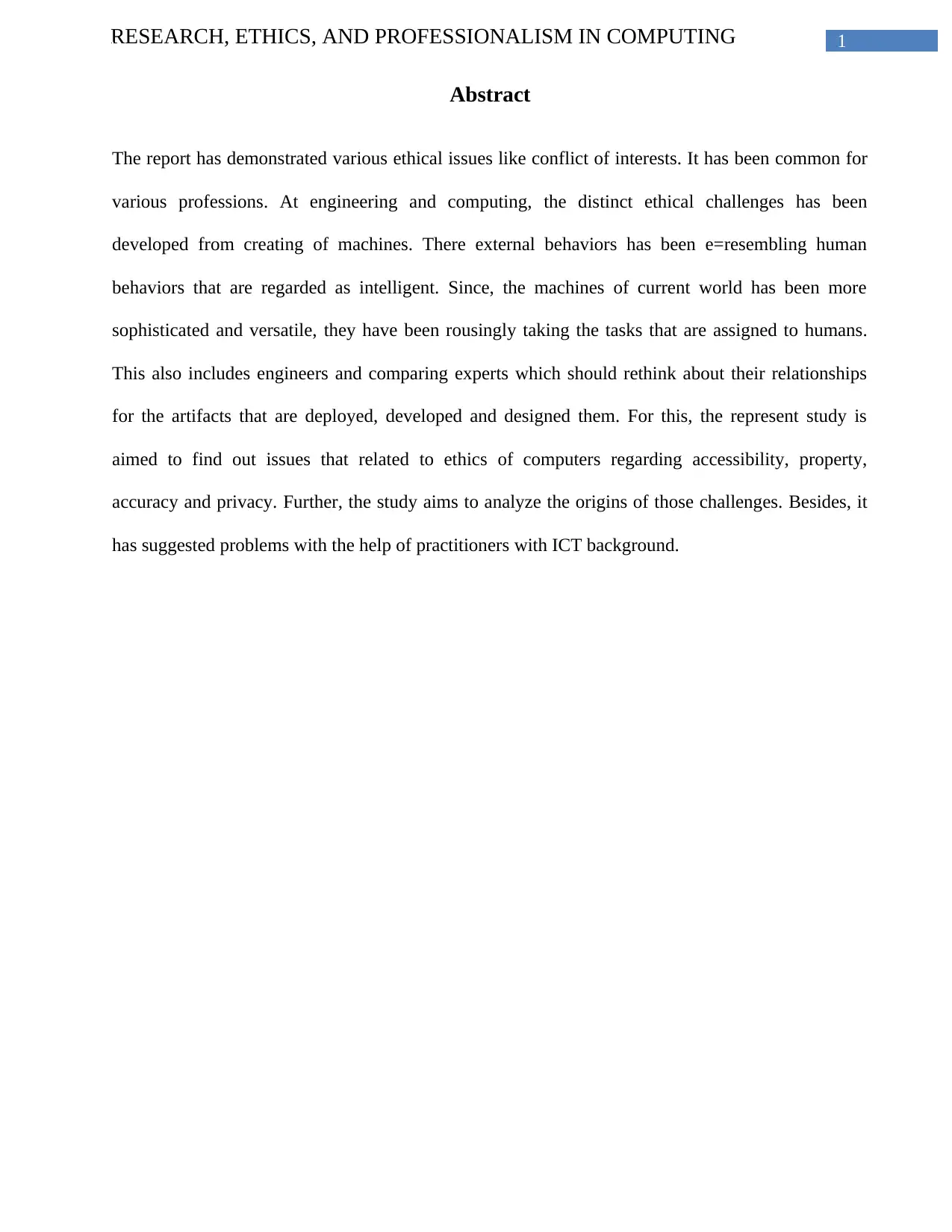
1RESEARCH, ETHICS, AND PROFESSIONALISM IN COMPUTING
Abstract
The report has demonstrated various ethical issues like conflict of interests. It has been common for
various professions. At engineering and computing, the distinct ethical challenges has been
developed from creating of machines. There external behaviors has been e=resembling human
behaviors that are regarded as intelligent. Since, the machines of current world has been more
sophisticated and versatile, they have been rousingly taking the tasks that are assigned to humans.
This also includes engineers and comparing experts which should rethink about their relationships
for the artifacts that are deployed, developed and designed them. For this, the represent study is
aimed to find out issues that related to ethics of computers regarding accessibility, property,
accuracy and privacy. Further, the study aims to analyze the origins of those challenges. Besides, it
has suggested problems with the help of practitioners with ICT background.
Abstract
The report has demonstrated various ethical issues like conflict of interests. It has been common for
various professions. At engineering and computing, the distinct ethical challenges has been
developed from creating of machines. There external behaviors has been e=resembling human
behaviors that are regarded as intelligent. Since, the machines of current world has been more
sophisticated and versatile, they have been rousingly taking the tasks that are assigned to humans.
This also includes engineers and comparing experts which should rethink about their relationships
for the artifacts that are deployed, developed and designed them. For this, the represent study is
aimed to find out issues that related to ethics of computers regarding accessibility, property,
accuracy and privacy. Further, the study aims to analyze the origins of those challenges. Besides, it
has suggested problems with the help of practitioners with ICT background.
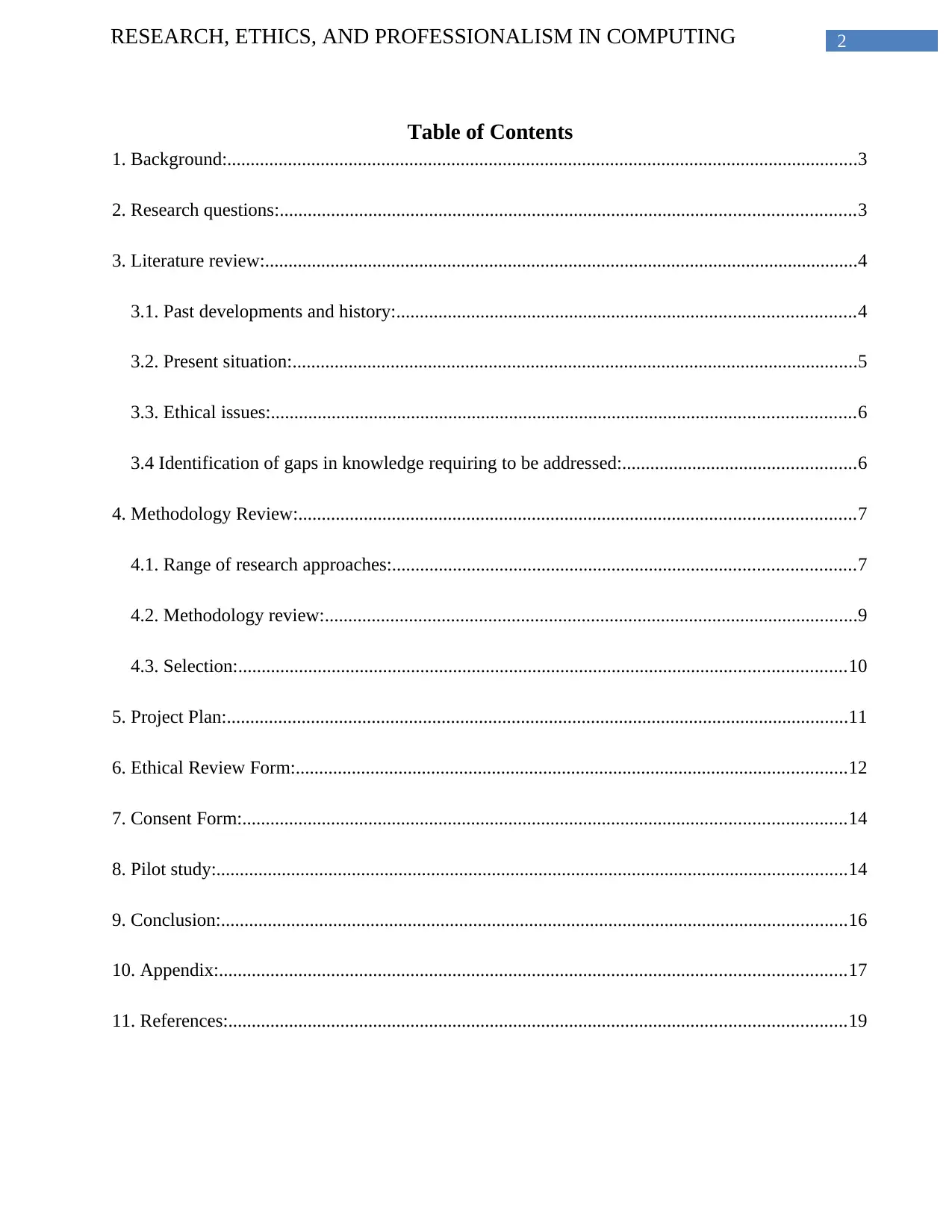
2RESEARCH, ETHICS, AND PROFESSIONALISM IN COMPUTING
Table of Contents
1. Background:.......................................................................................................................................3
2. Research questions:...........................................................................................................................3
3. Literature review:...............................................................................................................................4
3.1. Past developments and history:..................................................................................................4
3.2. Present situation:.........................................................................................................................5
3.3. Ethical issues:.............................................................................................................................6
3.4 Identification of gaps in knowledge requiring to be addressed:..................................................6
4. Methodology Review:.......................................................................................................................7
4.1. Range of research approaches:...................................................................................................7
4.2. Methodology review:..................................................................................................................9
4.3. Selection:..................................................................................................................................10
5. Project Plan:.....................................................................................................................................11
6. Ethical Review Form:......................................................................................................................12
7. Consent Form:.................................................................................................................................14
8. Pilot study:.......................................................................................................................................14
9. Conclusion:......................................................................................................................................16
10. Appendix:......................................................................................................................................17
11. References:....................................................................................................................................19
Table of Contents
1. Background:.......................................................................................................................................3
2. Research questions:...........................................................................................................................3
3. Literature review:...............................................................................................................................4
3.1. Past developments and history:..................................................................................................4
3.2. Present situation:.........................................................................................................................5
3.3. Ethical issues:.............................................................................................................................6
3.4 Identification of gaps in knowledge requiring to be addressed:..................................................6
4. Methodology Review:.......................................................................................................................7
4.1. Range of research approaches:...................................................................................................7
4.2. Methodology review:..................................................................................................................9
4.3. Selection:..................................................................................................................................10
5. Project Plan:.....................................................................................................................................11
6. Ethical Review Form:......................................................................................................................12
7. Consent Form:.................................................................................................................................14
8. Pilot study:.......................................................................................................................................14
9. Conclusion:......................................................................................................................................16
10. Appendix:......................................................................................................................................17
11. References:....................................................................................................................................19
⊘ This is a preview!⊘
Do you want full access?
Subscribe today to unlock all pages.

Trusted by 1+ million students worldwide
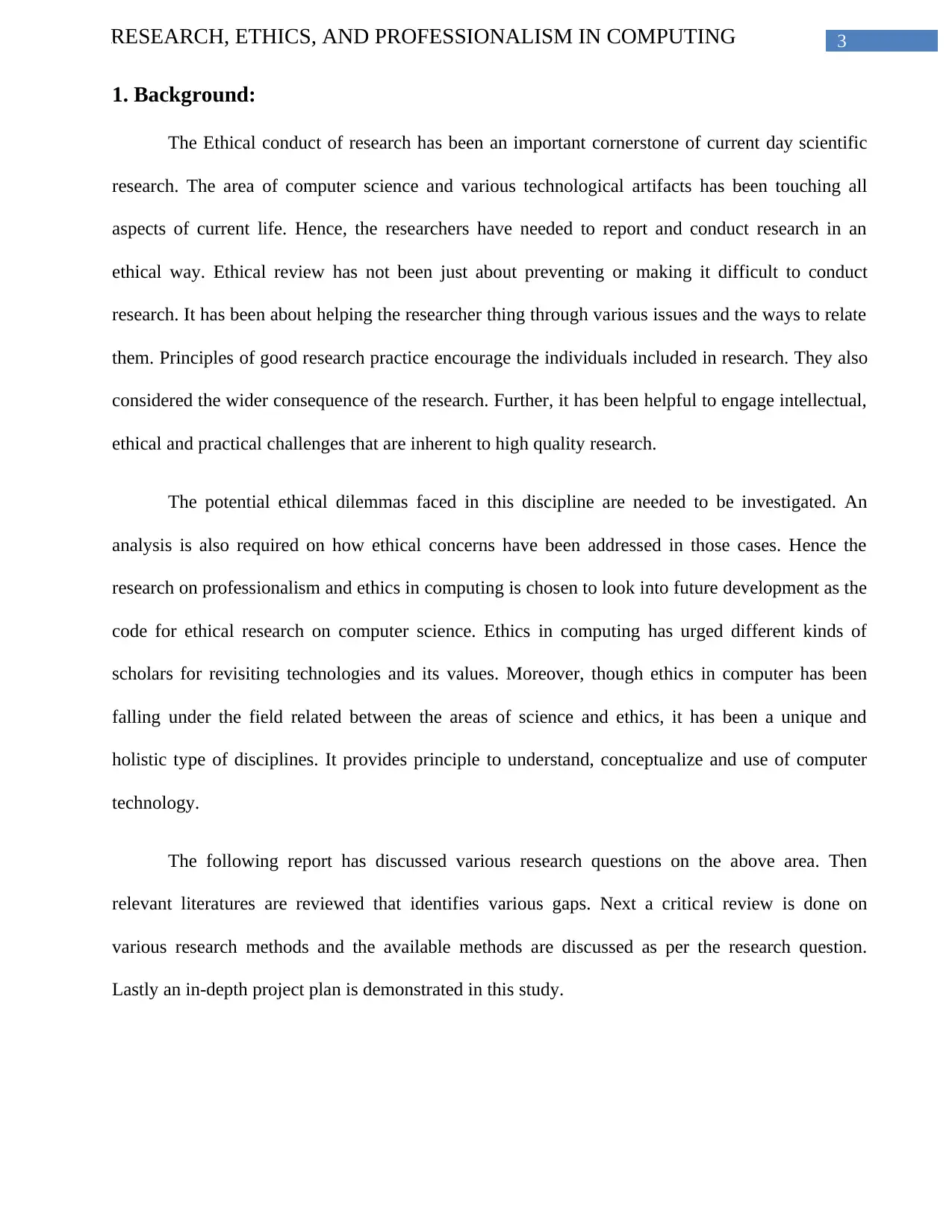
3RESEARCH, ETHICS, AND PROFESSIONALISM IN COMPUTING
1. Background:
The Ethical conduct of research has been an important cornerstone of current day scientific
research. The area of computer science and various technological artifacts has been touching all
aspects of current life. Hence, the researchers have needed to report and conduct research in an
ethical way. Ethical review has not been just about preventing or making it difficult to conduct
research. It has been about helping the researcher thing through various issues and the ways to relate
them. Principles of good research practice encourage the individuals included in research. They also
considered the wider consequence of the research. Further, it has been helpful to engage intellectual,
ethical and practical challenges that are inherent to high quality research.
The potential ethical dilemmas faced in this discipline are needed to be investigated. An
analysis is also required on how ethical concerns have been addressed in those cases. Hence the
research on professionalism and ethics in computing is chosen to look into future development as the
code for ethical research on computer science. Ethics in computing has urged different kinds of
scholars for revisiting technologies and its values. Moreover, though ethics in computer has been
falling under the field related between the areas of science and ethics, it has been a unique and
holistic type of disciplines. It provides principle to understand, conceptualize and use of computer
technology.
The following report has discussed various research questions on the above area. Then
relevant literatures are reviewed that identifies various gaps. Next a critical review is done on
various research methods and the available methods are discussed as per the research question.
Lastly an in-depth project plan is demonstrated in this study.
1. Background:
The Ethical conduct of research has been an important cornerstone of current day scientific
research. The area of computer science and various technological artifacts has been touching all
aspects of current life. Hence, the researchers have needed to report and conduct research in an
ethical way. Ethical review has not been just about preventing or making it difficult to conduct
research. It has been about helping the researcher thing through various issues and the ways to relate
them. Principles of good research practice encourage the individuals included in research. They also
considered the wider consequence of the research. Further, it has been helpful to engage intellectual,
ethical and practical challenges that are inherent to high quality research.
The potential ethical dilemmas faced in this discipline are needed to be investigated. An
analysis is also required on how ethical concerns have been addressed in those cases. Hence the
research on professionalism and ethics in computing is chosen to look into future development as the
code for ethical research on computer science. Ethics in computing has urged different kinds of
scholars for revisiting technologies and its values. Moreover, though ethics in computer has been
falling under the field related between the areas of science and ethics, it has been a unique and
holistic type of disciplines. It provides principle to understand, conceptualize and use of computer
technology.
The following report has discussed various research questions on the above area. Then
relevant literatures are reviewed that identifies various gaps. Next a critical review is done on
various research methods and the available methods are discussed as per the research question.
Lastly an in-depth project plan is demonstrated in this study.
Paraphrase This Document
Need a fresh take? Get an instant paraphrase of this document with our AI Paraphraser
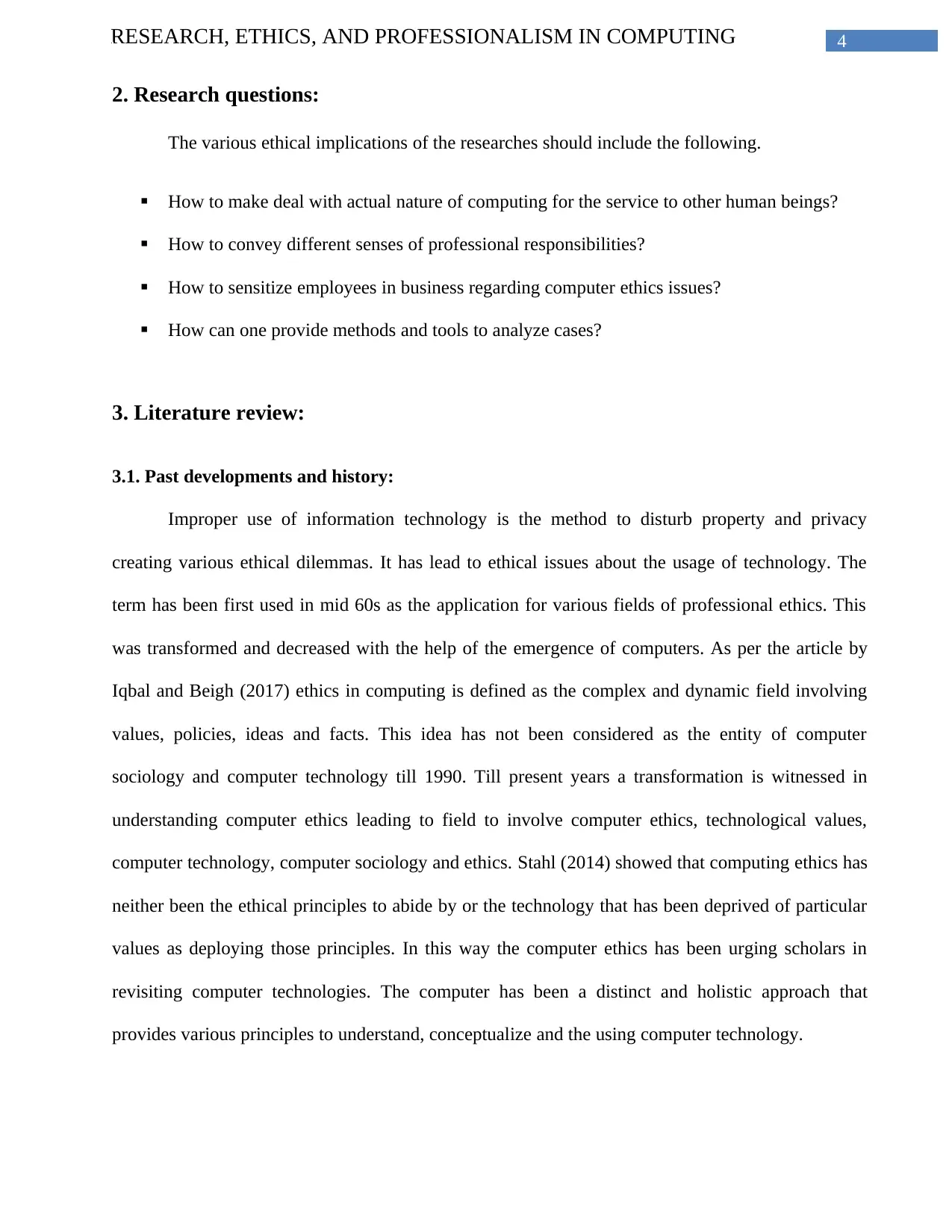
4RESEARCH, ETHICS, AND PROFESSIONALISM IN COMPUTING
2. Research questions:
The various ethical implications of the researches should include the following.
How to make deal with actual nature of computing for the service to other human beings?
How to convey different senses of professional responsibilities?
How to sensitize employees in business regarding computer ethics issues?
How can one provide methods and tools to analyze cases?
3. Literature review:
3.1. Past developments and history:
Improper use of information technology is the method to disturb property and privacy
creating various ethical dilemmas. It has lead to ethical issues about the usage of technology. The
term has been first used in mid 60s as the application for various fields of professional ethics. This
was transformed and decreased with the help of the emergence of computers. As per the article by
Iqbal and Beigh (2017) ethics in computing is defined as the complex and dynamic field involving
values, policies, ideas and facts. This idea has not been considered as the entity of computer
sociology and computer technology till 1990. Till present years a transformation is witnessed in
understanding computer ethics leading to field to involve computer ethics, technological values,
computer technology, computer sociology and ethics. Stahl (2014) showed that computing ethics has
neither been the ethical principles to abide by or the technology that has been deprived of particular
values as deploying those principles. In this way the computer ethics has been urging scholars in
revisiting computer technologies. The computer has been a distinct and holistic approach that
provides various principles to understand, conceptualize and the using computer technology.
2. Research questions:
The various ethical implications of the researches should include the following.
How to make deal with actual nature of computing for the service to other human beings?
How to convey different senses of professional responsibilities?
How to sensitize employees in business regarding computer ethics issues?
How can one provide methods and tools to analyze cases?
3. Literature review:
3.1. Past developments and history:
Improper use of information technology is the method to disturb property and privacy
creating various ethical dilemmas. It has lead to ethical issues about the usage of technology. The
term has been first used in mid 60s as the application for various fields of professional ethics. This
was transformed and decreased with the help of the emergence of computers. As per the article by
Iqbal and Beigh (2017) ethics in computing is defined as the complex and dynamic field involving
values, policies, ideas and facts. This idea has not been considered as the entity of computer
sociology and computer technology till 1990. Till present years a transformation is witnessed in
understanding computer ethics leading to field to involve computer ethics, technological values,
computer technology, computer sociology and ethics. Stahl (2014) showed that computing ethics has
neither been the ethical principles to abide by or the technology that has been deprived of particular
values as deploying those principles. In this way the computer ethics has been urging scholars in
revisiting computer technologies. The computer has been a distinct and holistic approach that
provides various principles to understand, conceptualize and the using computer technology.
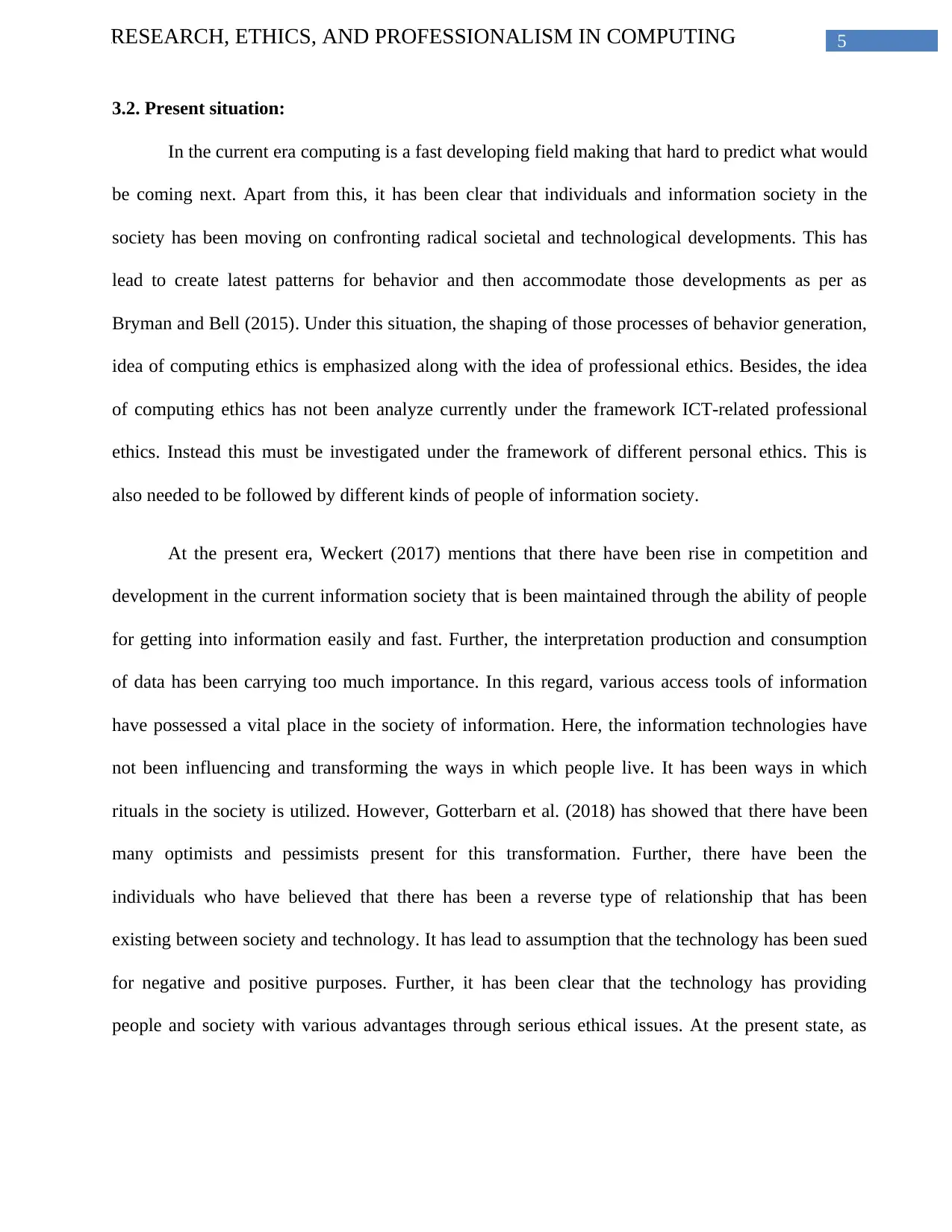
5RESEARCH, ETHICS, AND PROFESSIONALISM IN COMPUTING
3.2. Present situation:
In the current era computing is a fast developing field making that hard to predict what would
be coming next. Apart from this, it has been clear that individuals and information society in the
society has been moving on confronting radical societal and technological developments. This has
lead to create latest patterns for behavior and then accommodate those developments as per as
Bryman and Bell (2015). Under this situation, the shaping of those processes of behavior generation,
idea of computing ethics is emphasized along with the idea of professional ethics. Besides, the idea
of computing ethics has not been analyze currently under the framework ICT-related professional
ethics. Instead this must be investigated under the framework of different personal ethics. This is
also needed to be followed by different kinds of people of information society.
At the present era, Weckert (2017) mentions that there have been rise in competition and
development in the current information society that is been maintained through the ability of people
for getting into information easily and fast. Further, the interpretation production and consumption
of data has been carrying too much importance. In this regard, various access tools of information
have possessed a vital place in the society of information. Here, the information technologies have
not been influencing and transforming the ways in which people live. It has been ways in which
rituals in the society is utilized. However, Gotterbarn et al. (2018) has showed that there have been
many optimists and pessimists present for this transformation. Further, there have been the
individuals who have believed that there has been a reverse type of relationship that has been
existing between society and technology. It has lead to assumption that the technology has been sued
for negative and positive purposes. Further, it has been clear that the technology has providing
people and society with various advantages through serious ethical issues. At the present state, as
3.2. Present situation:
In the current era computing is a fast developing field making that hard to predict what would
be coming next. Apart from this, it has been clear that individuals and information society in the
society has been moving on confronting radical societal and technological developments. This has
lead to create latest patterns for behavior and then accommodate those developments as per as
Bryman and Bell (2015). Under this situation, the shaping of those processes of behavior generation,
idea of computing ethics is emphasized along with the idea of professional ethics. Besides, the idea
of computing ethics has not been analyze currently under the framework ICT-related professional
ethics. Instead this must be investigated under the framework of different personal ethics. This is
also needed to be followed by different kinds of people of information society.
At the present era, Weckert (2017) mentions that there have been rise in competition and
development in the current information society that is been maintained through the ability of people
for getting into information easily and fast. Further, the interpretation production and consumption
of data has been carrying too much importance. In this regard, various access tools of information
have possessed a vital place in the society of information. Here, the information technologies have
not been influencing and transforming the ways in which people live. It has been ways in which
rituals in the society is utilized. However, Gotterbarn et al. (2018) has showed that there have been
many optimists and pessimists present for this transformation. Further, there have been the
individuals who have believed that there has been a reverse type of relationship that has been
existing between society and technology. It has lead to assumption that the technology has been sued
for negative and positive purposes. Further, it has been clear that the technology has providing
people and society with various advantages through serious ethical issues. At the present state, as
⊘ This is a preview!⊘
Do you want full access?
Subscribe today to unlock all pages.

Trusted by 1+ million students worldwide
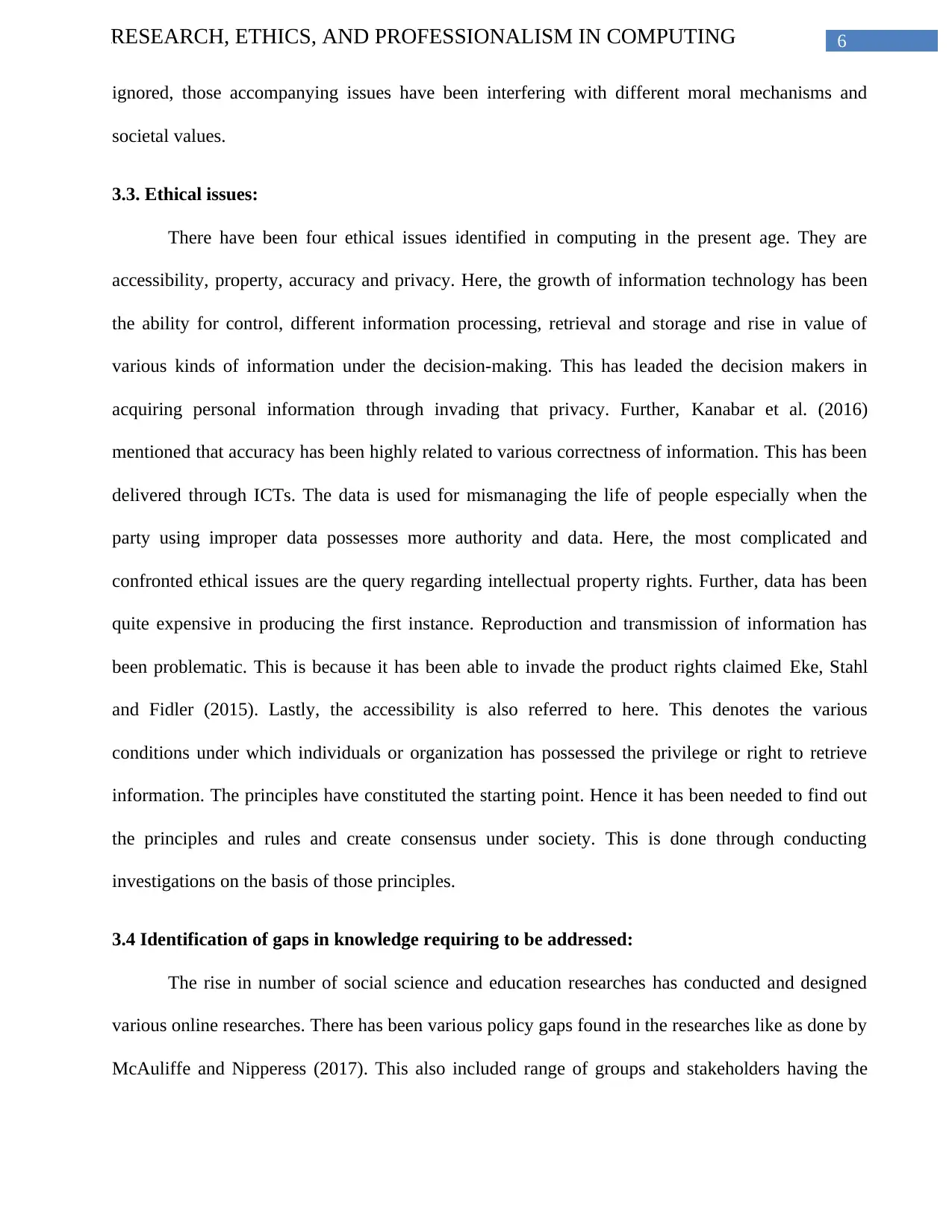
6RESEARCH, ETHICS, AND PROFESSIONALISM IN COMPUTING
ignored, those accompanying issues have been interfering with different moral mechanisms and
societal values.
3.3. Ethical issues:
There have been four ethical issues identified in computing in the present age. They are
accessibility, property, accuracy and privacy. Here, the growth of information technology has been
the ability for control, different information processing, retrieval and storage and rise in value of
various kinds of information under the decision-making. This has leaded the decision makers in
acquiring personal information through invading that privacy. Further, Kanabar et al. (2016)
mentioned that accuracy has been highly related to various correctness of information. This has been
delivered through ICTs. The data is used for mismanaging the life of people especially when the
party using improper data possesses more authority and data. Here, the most complicated and
confronted ethical issues are the query regarding intellectual property rights. Further, data has been
quite expensive in producing the first instance. Reproduction and transmission of information has
been problematic. This is because it has been able to invade the product rights claimed Eke, Stahl
and Fidler (2015). Lastly, the accessibility is also referred to here. This denotes the various
conditions under which individuals or organization has possessed the privilege or right to retrieve
information. The principles have constituted the starting point. Hence it has been needed to find out
the principles and rules and create consensus under society. This is done through conducting
investigations on the basis of those principles.
3.4 Identification of gaps in knowledge requiring to be addressed:
The rise in number of social science and education researches has conducted and designed
various online researches. There has been various policy gaps found in the researches like as done by
McAuliffe and Nipperess (2017). This also included range of groups and stakeholders having the
ignored, those accompanying issues have been interfering with different moral mechanisms and
societal values.
3.3. Ethical issues:
There have been four ethical issues identified in computing in the present age. They are
accessibility, property, accuracy and privacy. Here, the growth of information technology has been
the ability for control, different information processing, retrieval and storage and rise in value of
various kinds of information under the decision-making. This has leaded the decision makers in
acquiring personal information through invading that privacy. Further, Kanabar et al. (2016)
mentioned that accuracy has been highly related to various correctness of information. This has been
delivered through ICTs. The data is used for mismanaging the life of people especially when the
party using improper data possesses more authority and data. Here, the most complicated and
confronted ethical issues are the query regarding intellectual property rights. Further, data has been
quite expensive in producing the first instance. Reproduction and transmission of information has
been problematic. This is because it has been able to invade the product rights claimed Eke, Stahl
and Fidler (2015). Lastly, the accessibility is also referred to here. This denotes the various
conditions under which individuals or organization has possessed the privilege or right to retrieve
information. The principles have constituted the starting point. Hence it has been needed to find out
the principles and rules and create consensus under society. This is done through conducting
investigations on the basis of those principles.
3.4 Identification of gaps in knowledge requiring to be addressed:
The rise in number of social science and education researches has conducted and designed
various online researches. There has been various policy gaps found in the researches like as done by
McAuliffe and Nipperess (2017). This also included range of groups and stakeholders having the
Paraphrase This Document
Need a fresh take? Get an instant paraphrase of this document with our AI Paraphraser
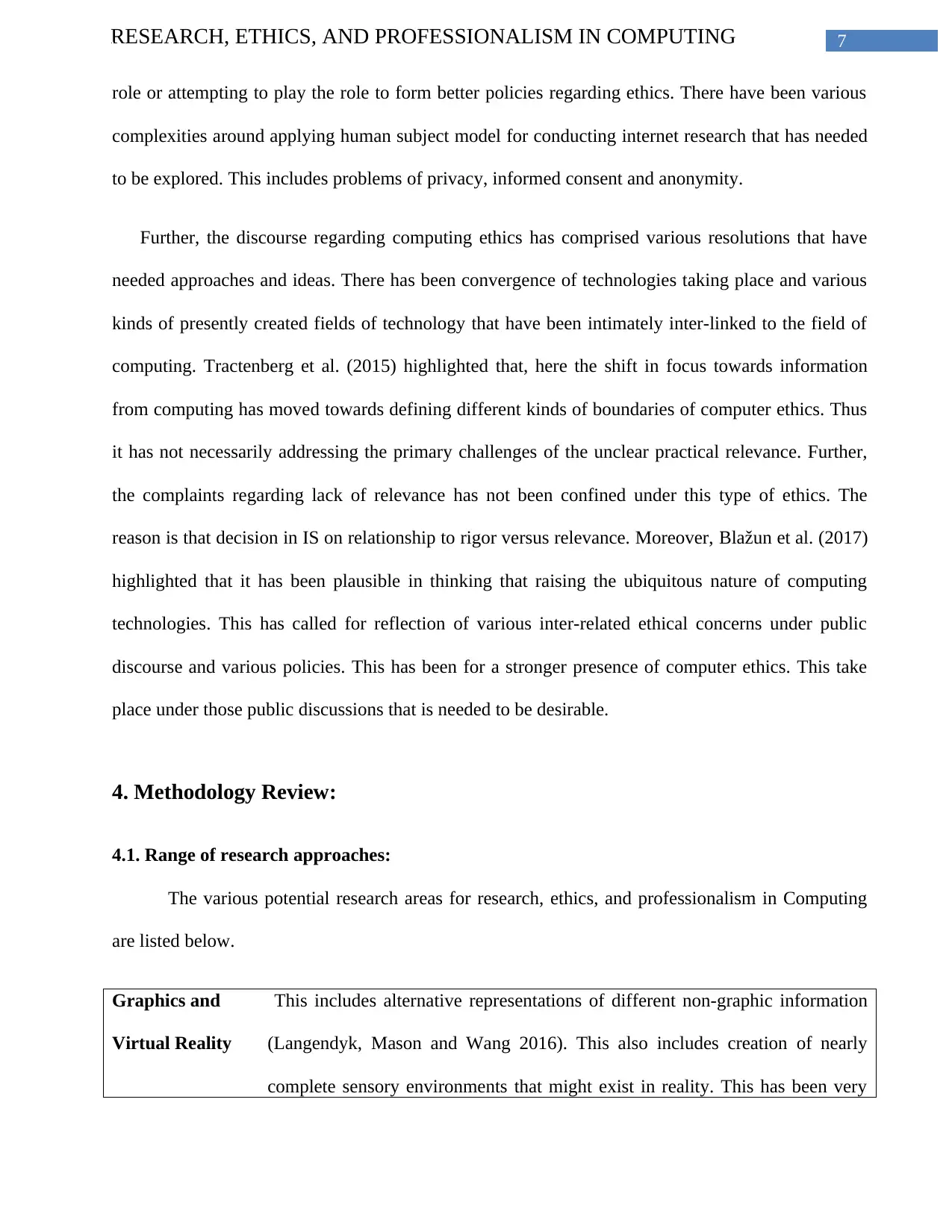
7RESEARCH, ETHICS, AND PROFESSIONALISM IN COMPUTING
role or attempting to play the role to form better policies regarding ethics. There have been various
complexities around applying human subject model for conducting internet research that has needed
to be explored. This includes problems of privacy, informed consent and anonymity.
Further, the discourse regarding computing ethics has comprised various resolutions that have
needed approaches and ideas. There has been convergence of technologies taking place and various
kinds of presently created fields of technology that have been intimately inter-linked to the field of
computing. Tractenberg et al. (2015) highlighted that, here the shift in focus towards information
from computing has moved towards defining different kinds of boundaries of computer ethics. Thus
it has not necessarily addressing the primary challenges of the unclear practical relevance. Further,
the complaints regarding lack of relevance has not been confined under this type of ethics. The
reason is that decision in IS on relationship to rigor versus relevance. Moreover, Blažun et al. (2017)
highlighted that it has been plausible in thinking that raising the ubiquitous nature of computing
technologies. This has called for reflection of various inter-related ethical concerns under public
discourse and various policies. This has been for a stronger presence of computer ethics. This take
place under those public discussions that is needed to be desirable.
4. Methodology Review:
4.1. Range of research approaches:
The various potential research areas for research, ethics, and professionalism in Computing
are listed below.
Graphics and
Virtual Reality
This includes alternative representations of different non-graphic information
(Langendyk, Mason and Wang 2016). This also includes creation of nearly
complete sensory environments that might exist in reality. This has been very
role or attempting to play the role to form better policies regarding ethics. There have been various
complexities around applying human subject model for conducting internet research that has needed
to be explored. This includes problems of privacy, informed consent and anonymity.
Further, the discourse regarding computing ethics has comprised various resolutions that have
needed approaches and ideas. There has been convergence of technologies taking place and various
kinds of presently created fields of technology that have been intimately inter-linked to the field of
computing. Tractenberg et al. (2015) highlighted that, here the shift in focus towards information
from computing has moved towards defining different kinds of boundaries of computer ethics. Thus
it has not necessarily addressing the primary challenges of the unclear practical relevance. Further,
the complaints regarding lack of relevance has not been confined under this type of ethics. The
reason is that decision in IS on relationship to rigor versus relevance. Moreover, Blažun et al. (2017)
highlighted that it has been plausible in thinking that raising the ubiquitous nature of computing
technologies. This has called for reflection of various inter-related ethical concerns under public
discourse and various policies. This has been for a stronger presence of computer ethics. This take
place under those public discussions that is needed to be desirable.
4. Methodology Review:
4.1. Range of research approaches:
The various potential research areas for research, ethics, and professionalism in Computing
are listed below.
Graphics and
Virtual Reality
This includes alternative representations of different non-graphic information
(Langendyk, Mason and Wang 2016). This also includes creation of nearly
complete sensory environments that might exist in reality. This has been very
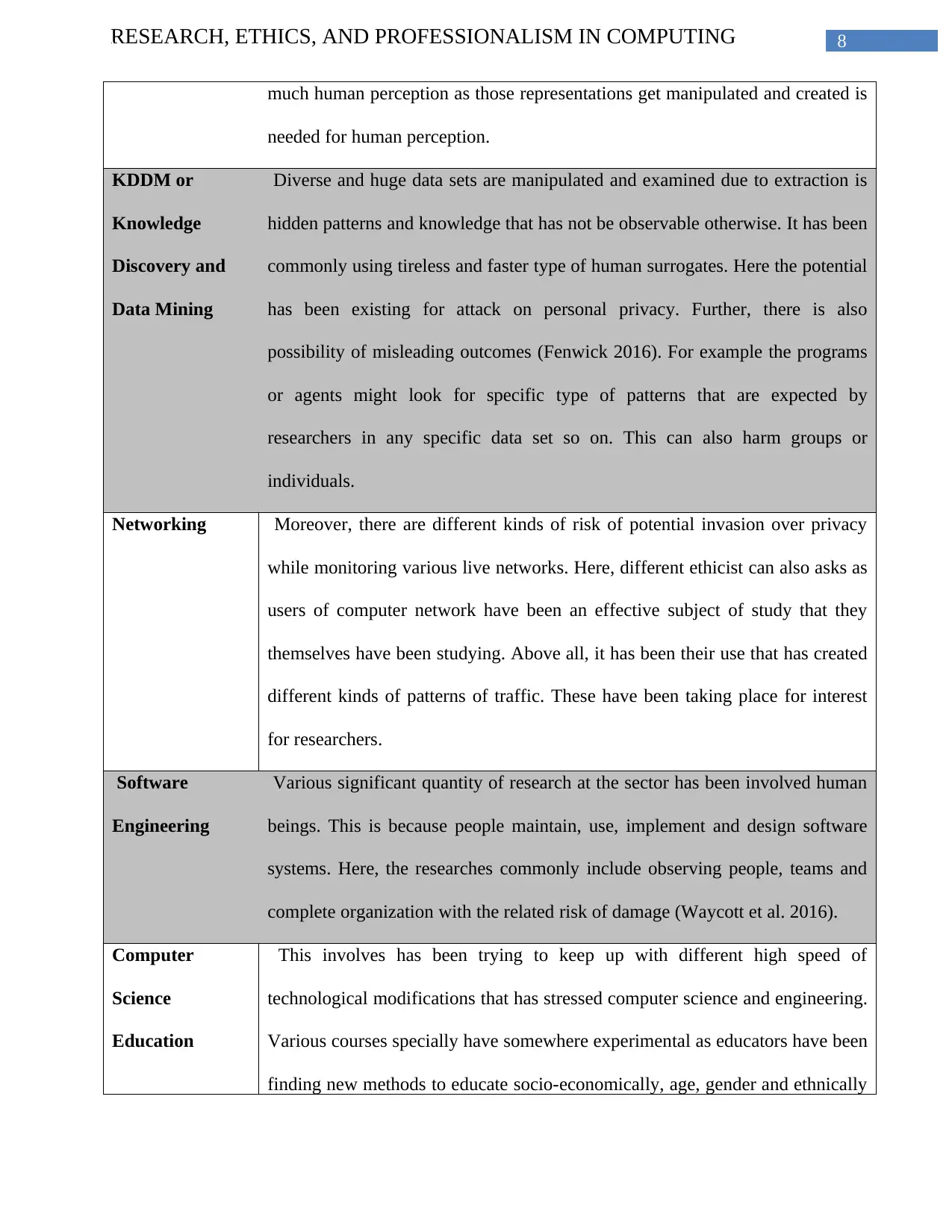
8RESEARCH, ETHICS, AND PROFESSIONALISM IN COMPUTING
much human perception as those representations get manipulated and created is
needed for human perception.
KDDM or
Knowledge
Discovery and
Data Mining
Diverse and huge data sets are manipulated and examined due to extraction is
hidden patterns and knowledge that has not be observable otherwise. It has been
commonly using tireless and faster type of human surrogates. Here the potential
has been existing for attack on personal privacy. Further, there is also
possibility of misleading outcomes (Fenwick 2016). For example the programs
or agents might look for specific type of patterns that are expected by
researchers in any specific data set so on. This can also harm groups or
individuals.
Networking Moreover, there are different kinds of risk of potential invasion over privacy
while monitoring various live networks. Here, different ethicist can also asks as
users of computer network have been an effective subject of study that they
themselves have been studying. Above all, it has been their use that has created
different kinds of patterns of traffic. These have been taking place for interest
for researchers.
Software
Engineering
Various significant quantity of research at the sector has been involved human
beings. This is because people maintain, use, implement and design software
systems. Here, the researches commonly include observing people, teams and
complete organization with the related risk of damage (Waycott et al. 2016).
Computer
Science
Education
This involves has been trying to keep up with different high speed of
technological modifications that has stressed computer science and engineering.
Various courses specially have somewhere experimental as educators have been
finding new methods to educate socio-economically, age, gender and ethnically
much human perception as those representations get manipulated and created is
needed for human perception.
KDDM or
Knowledge
Discovery and
Data Mining
Diverse and huge data sets are manipulated and examined due to extraction is
hidden patterns and knowledge that has not be observable otherwise. It has been
commonly using tireless and faster type of human surrogates. Here the potential
has been existing for attack on personal privacy. Further, there is also
possibility of misleading outcomes (Fenwick 2016). For example the programs
or agents might look for specific type of patterns that are expected by
researchers in any specific data set so on. This can also harm groups or
individuals.
Networking Moreover, there are different kinds of risk of potential invasion over privacy
while monitoring various live networks. Here, different ethicist can also asks as
users of computer network have been an effective subject of study that they
themselves have been studying. Above all, it has been their use that has created
different kinds of patterns of traffic. These have been taking place for interest
for researchers.
Software
Engineering
Various significant quantity of research at the sector has been involved human
beings. This is because people maintain, use, implement and design software
systems. Here, the researches commonly include observing people, teams and
complete organization with the related risk of damage (Waycott et al. 2016).
Computer
Science
Education
This involves has been trying to keep up with different high speed of
technological modifications that has stressed computer science and engineering.
Various courses specially have somewhere experimental as educators have been
finding new methods to educate socio-economically, age, gender and ethnically
⊘ This is a preview!⊘
Do you want full access?
Subscribe today to unlock all pages.

Trusted by 1+ million students worldwide
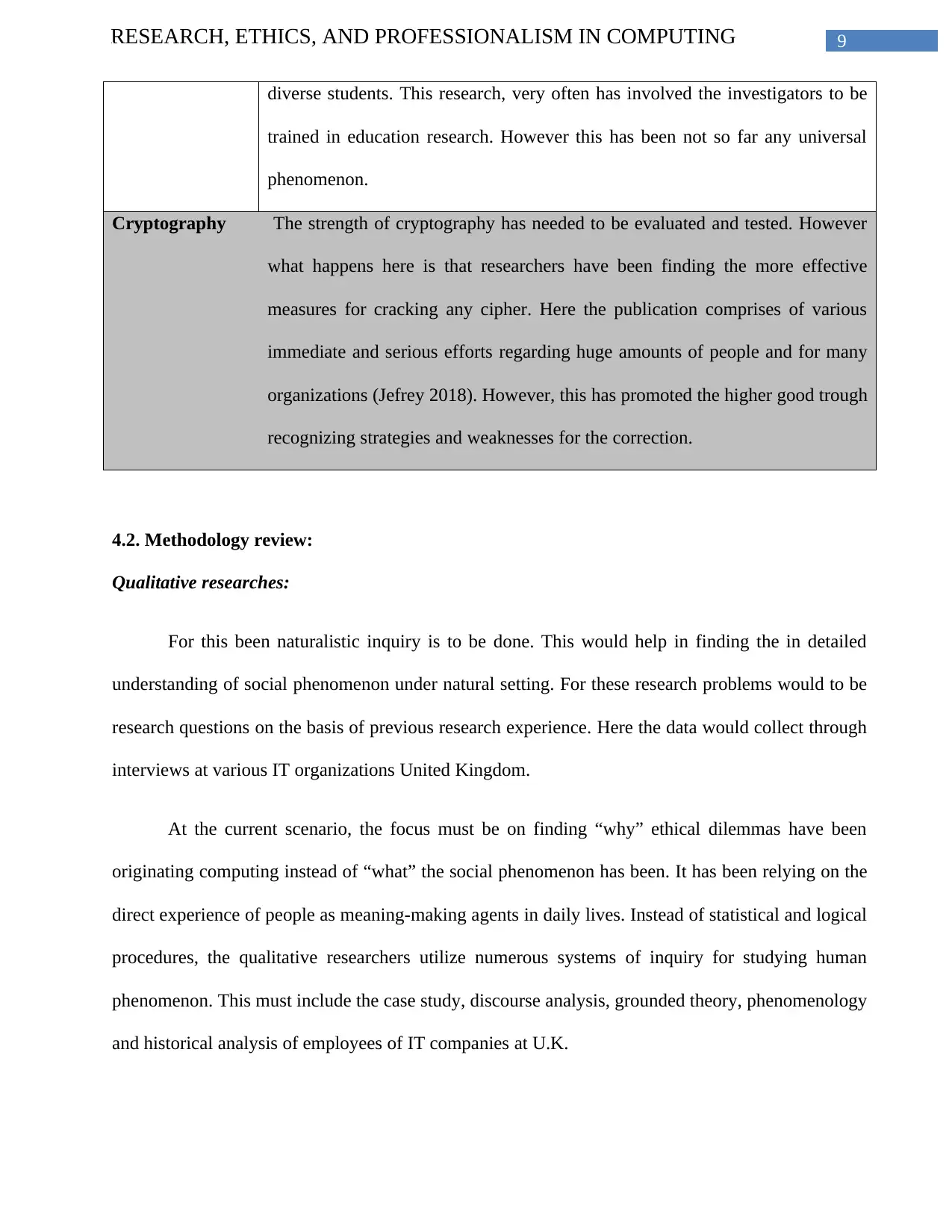
9RESEARCH, ETHICS, AND PROFESSIONALISM IN COMPUTING
diverse students. This research, very often has involved the investigators to be
trained in education research. However this has been not so far any universal
phenomenon.
Cryptography The strength of cryptography has needed to be evaluated and tested. However
what happens here is that researchers have been finding the more effective
measures for cracking any cipher. Here the publication comprises of various
immediate and serious efforts regarding huge amounts of people and for many
organizations (Jefrey 2018). However, this has promoted the higher good trough
recognizing strategies and weaknesses for the correction.
4.2. Methodology review:
Qualitative researches:
For this been naturalistic inquiry is to be done. This would help in finding the in detailed
understanding of social phenomenon under natural setting. For these research problems would to be
research questions on the basis of previous research experience. Here the data would collect through
interviews at various IT organizations United Kingdom.
At the current scenario, the focus must be on finding “why” ethical dilemmas have been
originating computing instead of “what” the social phenomenon has been. It has been relying on the
direct experience of people as meaning-making agents in daily lives. Instead of statistical and logical
procedures, the qualitative researchers utilize numerous systems of inquiry for studying human
phenomenon. This must include the case study, discourse analysis, grounded theory, phenomenology
and historical analysis of employees of IT companies at U.K.
diverse students. This research, very often has involved the investigators to be
trained in education research. However this has been not so far any universal
phenomenon.
Cryptography The strength of cryptography has needed to be evaluated and tested. However
what happens here is that researchers have been finding the more effective
measures for cracking any cipher. Here the publication comprises of various
immediate and serious efforts regarding huge amounts of people and for many
organizations (Jefrey 2018). However, this has promoted the higher good trough
recognizing strategies and weaknesses for the correction.
4.2. Methodology review:
Qualitative researches:
For this been naturalistic inquiry is to be done. This would help in finding the in detailed
understanding of social phenomenon under natural setting. For these research problems would to be
research questions on the basis of previous research experience. Here the data would collect through
interviews at various IT organizations United Kingdom.
At the current scenario, the focus must be on finding “why” ethical dilemmas have been
originating computing instead of “what” the social phenomenon has been. It has been relying on the
direct experience of people as meaning-making agents in daily lives. Instead of statistical and logical
procedures, the qualitative researchers utilize numerous systems of inquiry for studying human
phenomenon. This must include the case study, discourse analysis, grounded theory, phenomenology
and historical analysis of employees of IT companies at U.K.
Paraphrase This Document
Need a fresh take? Get an instant paraphrase of this document with our AI Paraphraser
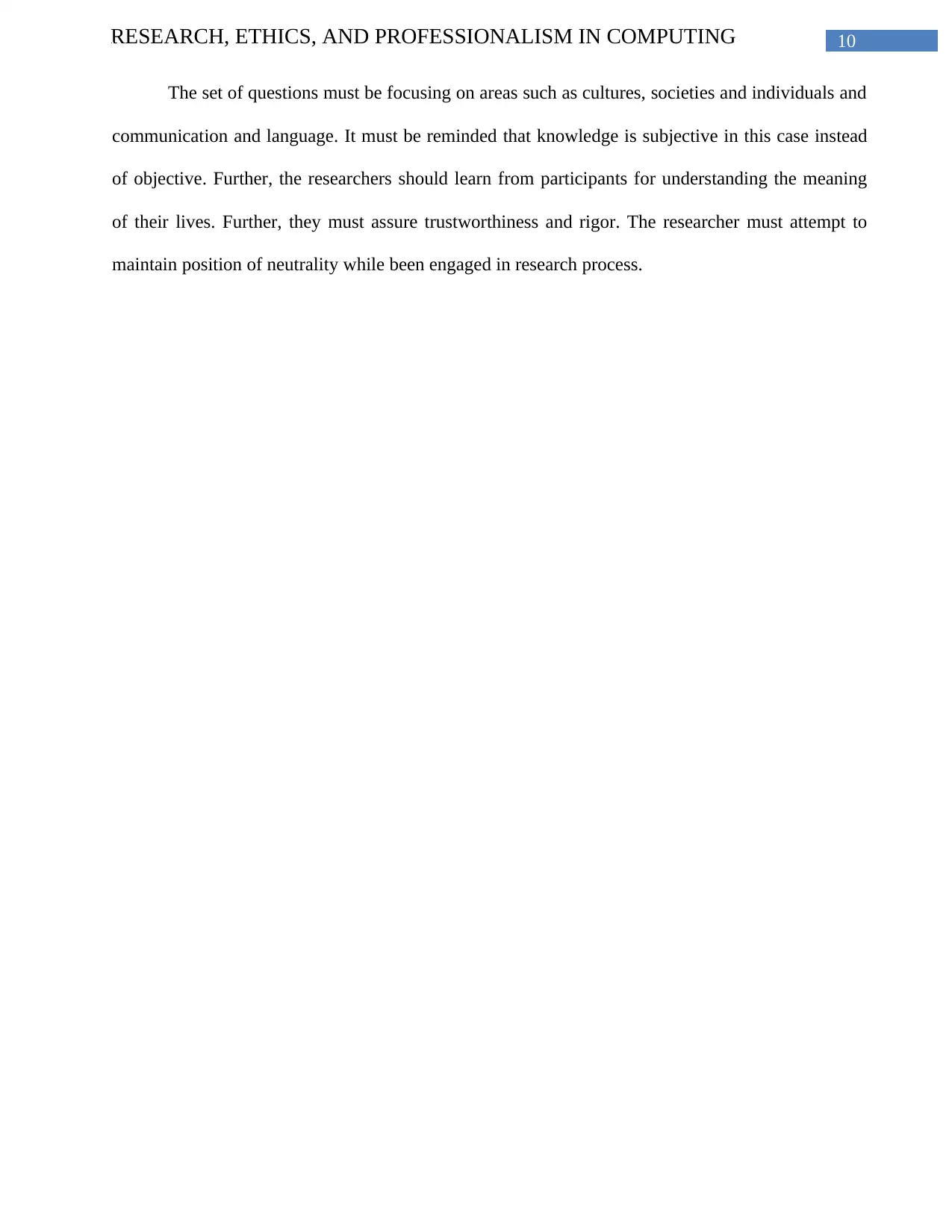
10RESEARCH, ETHICS, AND PROFESSIONALISM IN COMPUTING
The set of questions must be focusing on areas such as cultures, societies and individuals and
communication and language. It must be reminded that knowledge is subjective in this case instead
of objective. Further, the researchers should learn from participants for understanding the meaning
of their lives. Further, they must assure trustworthiness and rigor. The researcher must attempt to
maintain position of neutrality while been engaged in research process.
The set of questions must be focusing on areas such as cultures, societies and individuals and
communication and language. It must be reminded that knowledge is subjective in this case instead
of objective. Further, the researchers should learn from participants for understanding the meaning
of their lives. Further, they must assure trustworthiness and rigor. The researcher must attempt to
maintain position of neutrality while been engaged in research process.
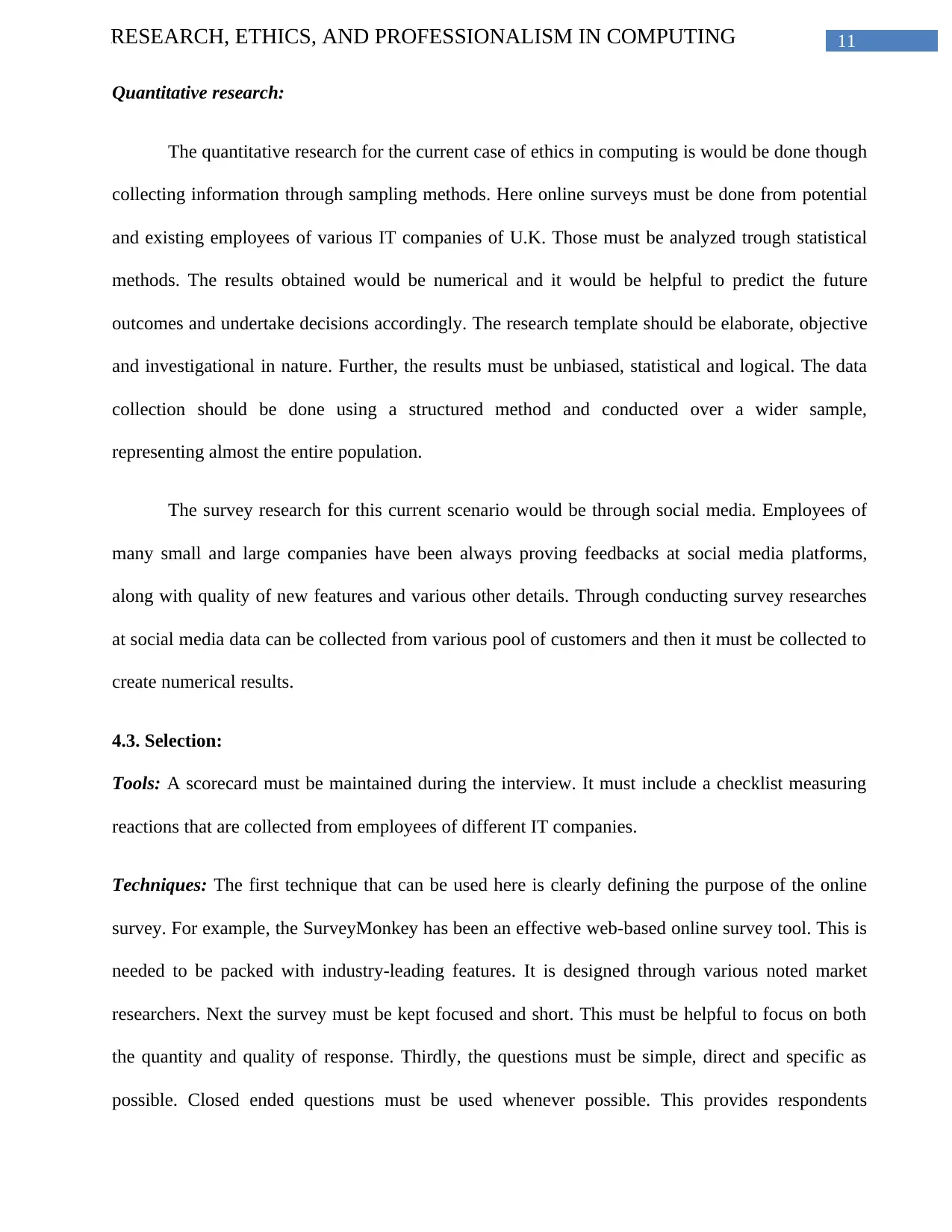
11RESEARCH, ETHICS, AND PROFESSIONALISM IN COMPUTING
Quantitative research:
The quantitative research for the current case of ethics in computing is would be done though
collecting information through sampling methods. Here online surveys must be done from potential
and existing employees of various IT companies of U.K. Those must be analyzed trough statistical
methods. The results obtained would be numerical and it would be helpful to predict the future
outcomes and undertake decisions accordingly. The research template should be elaborate, objective
and investigational in nature. Further, the results must be unbiased, statistical and logical. The data
collection should be done using a structured method and conducted over a wider sample,
representing almost the entire population.
The survey research for this current scenario would be through social media. Employees of
many small and large companies have been always proving feedbacks at social media platforms,
along with quality of new features and various other details. Through conducting survey researches
at social media data can be collected from various pool of customers and then it must be collected to
create numerical results.
4.3. Selection:
Tools: A scorecard must be maintained during the interview. It must include a checklist measuring
reactions that are collected from employees of different IT companies.
Techniques: The first technique that can be used here is clearly defining the purpose of the online
survey. For example, the SurveyMonkey has been an effective web-based online survey tool. This is
needed to be packed with industry-leading features. It is designed through various noted market
researchers. Next the survey must be kept focused and short. This must be helpful to focus on both
the quantity and quality of response. Thirdly, the questions must be simple, direct and specific as
possible. Closed ended questions must be used whenever possible. This provides respondents
Quantitative research:
The quantitative research for the current case of ethics in computing is would be done though
collecting information through sampling methods. Here online surveys must be done from potential
and existing employees of various IT companies of U.K. Those must be analyzed trough statistical
methods. The results obtained would be numerical and it would be helpful to predict the future
outcomes and undertake decisions accordingly. The research template should be elaborate, objective
and investigational in nature. Further, the results must be unbiased, statistical and logical. The data
collection should be done using a structured method and conducted over a wider sample,
representing almost the entire population.
The survey research for this current scenario would be through social media. Employees of
many small and large companies have been always proving feedbacks at social media platforms,
along with quality of new features and various other details. Through conducting survey researches
at social media data can be collected from various pool of customers and then it must be collected to
create numerical results.
4.3. Selection:
Tools: A scorecard must be maintained during the interview. It must include a checklist measuring
reactions that are collected from employees of different IT companies.
Techniques: The first technique that can be used here is clearly defining the purpose of the online
survey. For example, the SurveyMonkey has been an effective web-based online survey tool. This is
needed to be packed with industry-leading features. It is designed through various noted market
researchers. Next the survey must be kept focused and short. This must be helpful to focus on both
the quantity and quality of response. Thirdly, the questions must be simple, direct and specific as
possible. Closed ended questions must be used whenever possible. This provides respondents
⊘ This is a preview!⊘
Do you want full access?
Subscribe today to unlock all pages.

Trusted by 1+ million students worldwide
1 out of 21
Related Documents
Your All-in-One AI-Powered Toolkit for Academic Success.
+13062052269
info@desklib.com
Available 24*7 on WhatsApp / Email
![[object Object]](/_next/static/media/star-bottom.7253800d.svg)
Unlock your academic potential
Copyright © 2020–2026 A2Z Services. All Rights Reserved. Developed and managed by ZUCOL.



